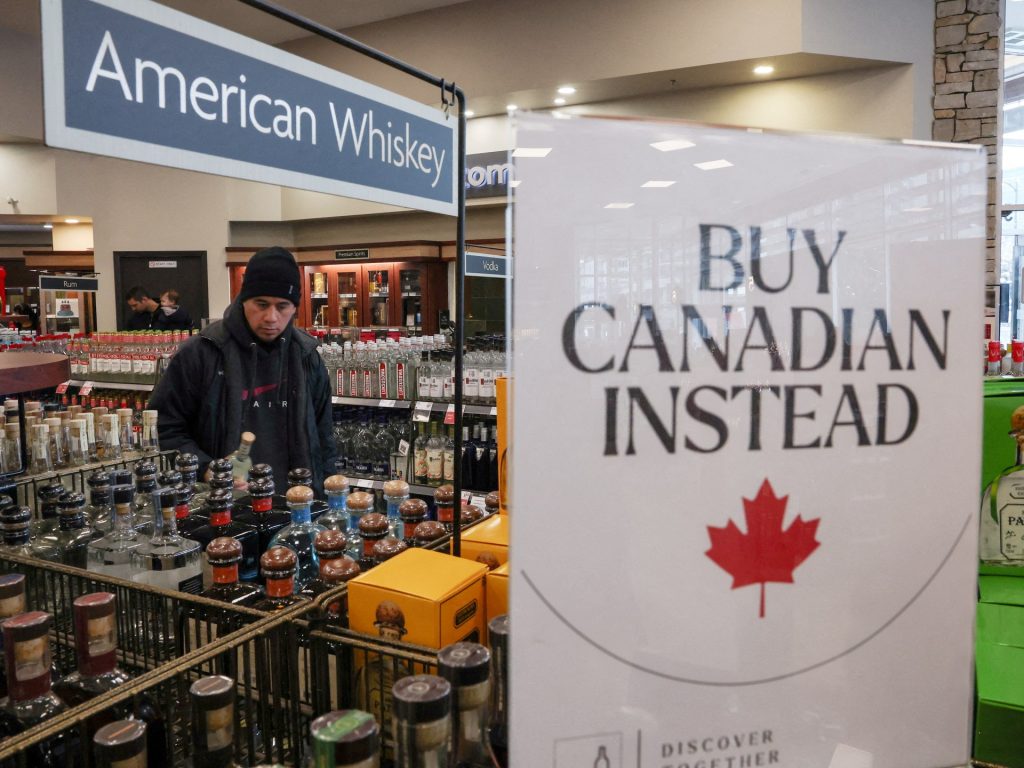Montreal, Canada – Canada has experienced a tumultuous start to 2025, with Prime Minister Justin Trudeau announcing his resignation days into the new year, a federal election looming, and the country’s affordability crisis deepening.
Now, Canada is facing what some economists have dubbed “its largest trade shock in nearly 100 years”.
United States President Donald Trump has threatened to impose 25-percent tariffs on a wide range of Canadian imports and 10-percent tariffs on Canadian energy.
While the measures were set to begin on Tuesday, Trudeau said on Monday afternoon that the US tariffs and retaliatory measures announced by his government would be delayed by “at least 30 days” as the countries work together on border security.
Yet for many across the country, the potential for a trade war between the longtime allies continues to fuel a sense of anger, as well as anxiety and confusion over what is to come.
Trump’s threat of tariffs has also raised questions about the nature of the cross-border relationship and spurred calls for Canada to boost in-country trade while looking beyond the US for more reliable international partners.
“It’s very, very worrisome right now for workers,” Lana Payne, the national coordinator of Unifor, Canada’s largest private-sector union, told Al Jazeera before the tariff delay was announced.
“A lot of concern, a lot of worry, a lot of uncertainty — they’re feeling all of it,” she said in a phone interview on Monday.
“But I would also say… they are feeling angry right now that the United States would do this to the Canadian economy, would do this to Canadian workers, considering our long history of working together.”
Canada-US ties
The US and Canada have enjoyed close political and trade ties for decades.
Last year, the US exported more than $322m in goods to Canada, according to US Census data. It also imported more than $377m worth of products from its northern neighbour.
Nearly three-quarters of Canada’s total trade exports go to the US. The country is also the US’s largest foreign energy supplier, with about 97 percent of Canadian crude oil exports going south of the border in 2023.
But Trump, who has routinely criticised Canada since he won re-election in November, has said the tariffs are necessary to push the Canadian government to stop fentanyl trafficking and irregular migration across its border with the US.
He has also argued that the tariffs seek to make up for a trade deficit with Canada, which he has dubbed a “subsidy”.
“We pay hundreds of Billions of Dollars to SUBSIDIZE Canada. Why? There is no reason. We don’t need anything they have. We have unlimited Energy, should make our own Cars, and have more Lumber than we can ever use,” the US president recently wrote on social media.
Trudeau has hit back, announcing retaliatory tariffs against about $106bn (155 billion Canadian dollars) of US goods on Saturday. Of that, about $20bn (30 billion Canadian dollars) was set to be imposed on Tuesday.
“We will stand strong for Canada. We will stand strong to ensure our countries continue to be the best neighbours in the world,” Trudeau said.
But on Monday afternoon, the Canadian prime minister announced the proposed tariffs would be paused “for at least 30 days” after he had a “good call” with Trump.
Canada will “appoint a Fentanyl Czar, we will list cartels as terrorists, ensure 24/7 eyes on the border, launch a Canada-US Joint Strike Force to combat organized crime, fentanyl and money laundering”, among other measures, Trudeau said.
I just had a good call with President Trump. Canada is implementing our $1.3 billion border plan — reinforcing the border with new choppers, technology and personnel, enhanced coordination with our American partners, and increased resources to stop the flow of fentanyl. Nearly…
— Justin Trudeau (@JustinTrudeau) February 3, 2025
‘Subject to Trump’s whims’
Asa McKercher, a professor at St Francis Xavier University who studies Canada-US relations, said the two countries have experienced tensions in the past.
He pointed to tensions over Canada’s refusal to join the US-led invasion of Iraq in 2003 and personal animosities between former US President John F Kennedy and Canadian Prime Minister John Diefenbaker in the early 1960s.
But McKercher said the current trade tensions have plunged the relationship to its lowest point.
“We haven’t really seen the Americans go out of their way to impose a policy that will just destroy the Canadian economy. That is the difference here,” McKercher told Al Jazeera.
He said that since Trump signed the order authorising tariffs against Canada and Trudeau unveiled reciprocal measures, there has been an uptick in nationalist sentiment in Canada.
Canadian crowds booed the US national anthem at hockey and basketball games over the weekend, while the leaders of several provinces have urged people to “buy Canadian” in response to the tariffs.
“Some people are reacting in the only ways they can, which is booing American hockey teams and not buying Kellogg’s cereal because it’s made in America,” he said.
For the average person, McKercher explained, those “little acts of defiance” offer “a sense of agency” in a situation where they might otherwise feel powerless.
“We’re really subject to the whims of a guy in the White House, and that’s a very scary thing.”

Confusion and uncertainty
At a small fruit-and-vegetable shop in Montreal on Monday morning, shoppers Patricia and Lorraine were looking for an avocado — but they had to make sure it was not from the US.
“It’s creating a lot of anxiety for everyone, I think,” Patricia, who only gave Al Jazeera her first name, said of the looming tariffs. “Even the atmosphere in general: The prices will go up, it will change our pace of life.”
“We have to boycott [US products]. We have to,” Lorraine said as the pair left the shop.
“We don’t have a choice,” Patricia added.
The shop’s owner, Amine Mulhim, said he was waiting to see how the potential tariffs would affect his business. He told Al Jazeera that he already largely sells local goods, but during the winter months, a greater portion of the produce comes from the US and Mexico.
“Already, everything is expensive,” he said.
A few blocks away, at a provincial liquor store, customer Angelo Baaco was adding US wines to a small shopping cart. The Quebec government had said that US alcohol will be taken off the shelves as of Tuesday.
“It’s just stuff that I’m not going to be able to get in the next few months, or who knows how long. So I figured, ‘OK, might as well get this,’” Baaco said, reaching for a red wine from California. “I’m going to grab another one, just in case.”
Yet the threat of a prolonged trade war goes beyond day-to-day purchases. For many Canadians — including those living in poverty and homelessness — the prospect could make an already difficult economic situation worse.

Georges Ohana — the director of homelessness prevention at the Old Brewery Mission, a support and advocacy organisation in Montreal — said his greatest concern is a potential loss of jobs as a result of the US tariffs.
“That can compound what has already been a very difficult start to the year in terms of inflation,” he told Al Jazeera.
Already, Ohana said there has been an increase in demand for food banks and shelter beds in recent years in Montreal. Rental costs in the city have also skyrocketed, making affordable housing harder to find.
“When you compound these different systems, it makes it more difficult for homeless men and women, people that are vulnerable, people that have trauma, to be able to get the necessary help they need,” he said.
But, Ohana added, “I don’t think we should jump to conclusions [on tariffs]. I think we should wait to see how this fares out.”
‘Not the actions of an ally’
Even as Canada appears to have secured a reprieve from US tariffs — at least for now — many Canadians have expressed anger at Trump’s repeated threats against their country.
Last week, political, labour and civil society leaders released the “Pledge for Canada” to build a nationwide response to the Trump administration’s policies.
That includes protecting Canadian sovereignty, reducing the country’s “dependence on the United States by diversifying our trade”, and building alliances with other countries, including on climate action, humanitarian aid and advancing democracy.
“It’s becoming very clear that to build resiliency for Canada in this increasingly turbulent world, it means actually lessening our dependency on our southern neighbour,” lawmaker Charlie Angus of the New Democratic Party said during a news conference announcing the campaign.
According to Payne at Unifor, a threat of tariffs — which Canada has experienced for weeks, since Trump first made his plan known in November — remains dangerous on its own.
“It causes industry to pause on investments. It causes industry to divert investment to the United States. It causes industry to cancel investments because tariffs make it more expensive for them to operate,” she explained.
But she said Trump’s tariff threat also has created an understanding in Canada that the country must review all of its economic and trade policies, including procurement processes, infrastructure projects and natural resource development.
“All of that is on the table in a way that it has not been on the table in a very long time,” she told Al Jazeera.
“There is a great appetite for this right now because there is a sense … that we no longer have a friend the way that we thought that we did, and a stable trading partner,” Payne added.
“We have a president that rips up trade agreements. We have a president that threatens us daily with measures that would throw our economy into a recession. These are not the actions of an ally.”








